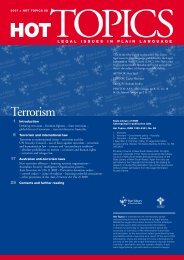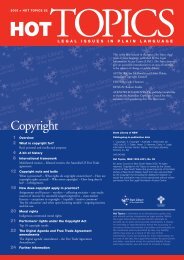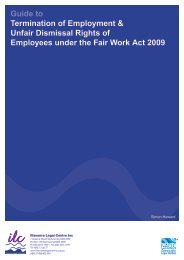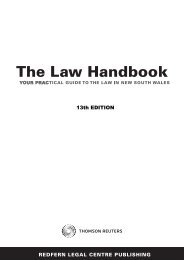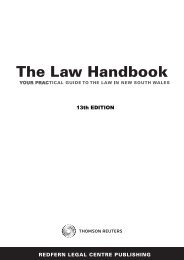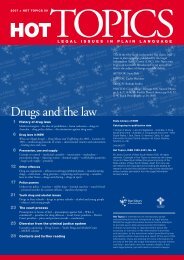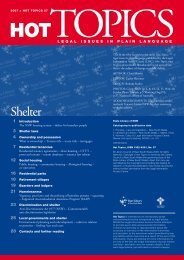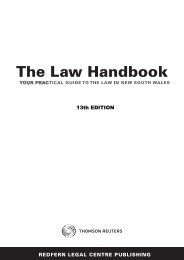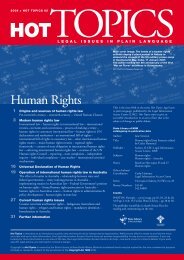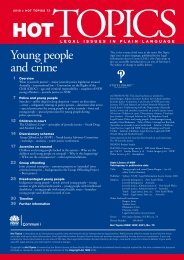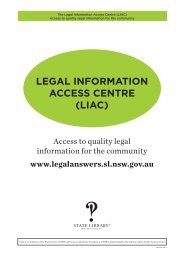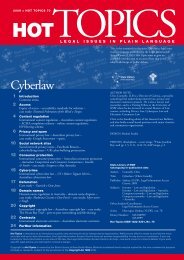Hot Topics 64 - Health and the Law - Legal Information Access Centre
Hot Topics 64 - Health and the Law - Legal Information Access Centre
Hot Topics 64 - Health and the Law - Legal Information Access Centre
You also want an ePaper? Increase the reach of your titles
YUMPU automatically turns print PDFs into web optimized ePapers that Google loves.
Human right<br />
to health<br />
medical eTHics <strong>and</strong> Human<br />
rigHTs laW<br />
<strong>Health</strong> law academics (<strong>and</strong> many of <strong>the</strong>ir students)<br />
are accustomed to viewing <strong>the</strong> fields of bioethics <strong>and</strong><br />
international human rights law as distinct areas of<br />
‘st<strong>and</strong>ards setting’ or ‘norms’. However, <strong>the</strong> development<br />
of medical ethics <strong>and</strong> human rights has many intriguing<br />
parallels. John Locke, a founding fa<strong>the</strong>r of human rights<br />
jurisprudence, was a physician who studied alongside<br />
Sydenham, a doctor of medicine who used accurate<br />
observation of symptoms to treat <strong>and</strong> classify illness,<br />
against <strong>the</strong> beliefs of many of his peers, gaining him <strong>the</strong><br />
title of ‘<strong>the</strong> English Hippocrates’. It seems possible that<br />
<strong>the</strong> major factor promoting both human rights norms<br />
<strong>and</strong> those of <strong>the</strong> Hippocratic Oath, was direct proximity<br />
to <strong>the</strong> relief of individual human suffering.<br />
International humanitarian law is an aggregation of<br />
customary <strong>and</strong> treaty based norms, concerned with <strong>the</strong><br />
treatment of <strong>the</strong> wounded, civilians <strong>and</strong> prisoners in<br />
war. It has many areas of overlap with medical ethics.<br />
Its origins may similarly be traced to <strong>the</strong> unrelieved<br />
suffering of wounded soldiers directly witnessed by<br />
Henry Dunant on <strong>the</strong> battlefield after <strong>the</strong> battle of<br />
Solferino in 1859. Dunant founded <strong>the</strong> Red Cross in<br />
1863 <strong>and</strong> was awarded <strong>the</strong> first Nobel Peace Prize in<br />
1901.<br />
Proving a breach of <strong>the</strong> Hippocratic Oath’s ethical<br />
obligation to ‘do no harm’ was central to <strong>the</strong> conviction<br />
of <strong>the</strong> Nazi doctors at <strong>the</strong> Nuremberg Trials after<br />
<strong>the</strong> Second World War for non-consensual, brutal<br />
experimentation, sterilisation <strong>and</strong> active non-voluntary<br />
euthanasia. Those proceedings spurred creation<br />
of <strong>the</strong> documents that remain central to medical<br />
ethics: <strong>the</strong> Declaration of Geneva, (or modernised<br />
<strong>the</strong> Hippocratic Oath), <strong>the</strong> Nuremberg Declaration on<br />
Human Experimentation, <strong>and</strong> <strong>the</strong> International Code of<br />
Medical Ethics.<br />
Mirroring <strong>the</strong>se international medical ethics documents<br />
are <strong>the</strong> three instruments that make up <strong>the</strong> international<br />
Bill of Human Rights:<br />
> Universal Declaration of Human Rights (UDHR);<br />
> International Covenant on Civil <strong>and</strong> Political Rights<br />
(ICCPR);<br />
> International Covenant on Economic, Cultural <strong>and</strong><br />
Social Rights (ICESCR).<br />
These instruments were directed at relationships<br />
between individuals (within <strong>the</strong> sphere of governmental<br />
responsibility), as well as relations between States.<br />
They contained many principles <strong>and</strong> obligations that<br />
resembled norms of medical ethics.<br />
Particularly overlapping with medical ethics in <strong>the</strong><br />
UDHR were provisions requiring respect for human<br />
dignity <strong>and</strong> equality (articles 1 <strong>and</strong> 2), as well as<br />
<strong>the</strong> human right to life (article 3). O<strong>the</strong>rs resembled<br />
components of medical ethics in prohibiting torture or<br />
cruel, inhuman or degrading treatment or punishment<br />
(article 5), requiring non-discrimination (article 7),<br />
freedom from arbitrary interference with privacy (article<br />
12) <strong>and</strong> progressive realisation of <strong>the</strong> human right to<br />
a st<strong>and</strong>ard of living adequate for health <strong>and</strong> medical<br />
care (article 25). In <strong>the</strong> same category was <strong>the</strong> human<br />
right to share in scientific advancement <strong>and</strong> its benefits<br />
(article 27).<br />
In considering <strong>the</strong> intersections between medical<br />
ethics <strong>and</strong> human rights it is important to take into<br />
account article 38 of <strong>the</strong> Statute of <strong>the</strong> International<br />
Court of Justice. This provision identifies international<br />
conventions <strong>and</strong> customary international law, among<br />
o<strong>the</strong>rs, as <strong>the</strong> sources of international law. Thus, as a<br />
declaration, ra<strong>the</strong>r than an international convention, <strong>the</strong><br />
UDHR did not directly create binding human rights<br />
norms under international law upon signatory states.<br />
Nei<strong>the</strong>r did UNESCO’s Universal Declaration on <strong>the</strong><br />
Human Genome <strong>and</strong> Human Rights, which overlaps<br />
with many areas of bioethics <strong>and</strong> medical ethics <strong>and</strong><br />
pronounces that <strong>the</strong> human genome represents part of<br />
<strong>the</strong> common heritage of humanity, whilst forbidding<br />
practices contrary to human dignity, such as human<br />
reproductive cloning.<br />
Human right to health 19



